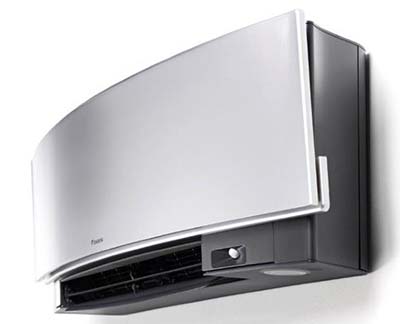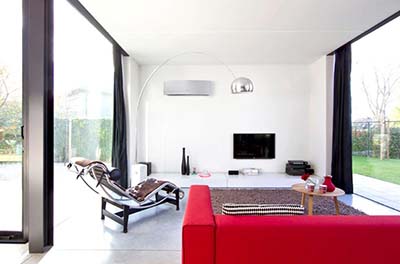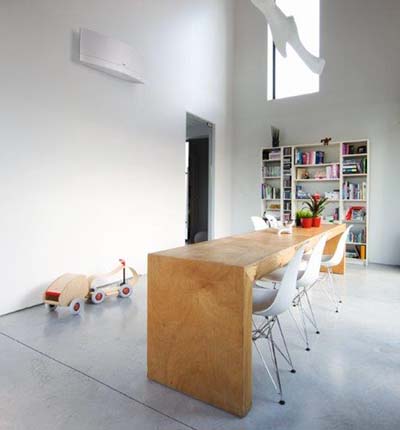
Daikin Zena (silver) air conditioner with vents open

Daikin Zena (silver) air conditioner in lounge

Daikin Zena (white) air conditioner in lounge
Each year, technology brings us promises of better, more efficient systems and gadgets. With all the new developments, it can get a bit overwhelming figuring out if it's worth jumping on the bandwagon or sticking with current technology. For air conditioning specialists, it is important to decide which technologies provide the best value for money, safety and reliable systems. So what are this year's coolest trends?
Human Sensor Control
A human sensor slows down the air conditioner's fan speed when the room is not in use and increases it when the room is re-entered. This means the air conditioner doesn't work as hard and saves on running costs. How much it saves is hard to say as the usual advice is to turn off reverse cycle air conditioners when the room is not in use for prolonged periods (the exception to this rule is to keep air conditioning on a constant low if it is going to be really hot for a few days and you want to prevent the brick walls in your home heating up).
Popular models with human sensor control built into them include:
- Daikin models with the Intelligent Eye feature (standard in most new split system air conditioners). The air flow is also adjusted to either side of the room from the split system to where the occupants are.
- In 2014, LG introduced sensors called Energy Control in their Premium range of split systems which adjusts air flow based on the number of occupants in the room.
- Airstream, a manufacturer of the new generation air conditioning controllers, brought in room sensors late 2014 that allow ducted reverse cycle air conditioners to change the fan speed in each zone. Advantage Air have a similar technology with sensors operated by the aircon controller.
Digital Scroll Technology
Digital Scroll technology helps reduce energy usage by sensing how much capacity is required to cool or heat an area and only using that amount. There are a couple of manufacturers that use digital scroll technology – the main one is South Australian company Actron Air. The beauty of Digital Scroll technology is its ability to slow the fan speed down much more than conventional ducted reverse cycle air conditioners, allowing it to reduce running costs below that of ducted reverse cycle inverter air conditioners. This feature is useful in a larger home with a big air conditioner where you regularly want to air condition only one small area e.g. a study or bedroom.
Demand Response Enabling Device (DRED)
Energy companies are very interested in this new feature, as it allows them to reduce peak load on the electricity grid. It works by the energy provider being able to limit the air conditioners' power output at high peak times. Unfortunately, this feature may not be popular with all home owners as it means you cannot take full advantage of your air conditioners' capacity on super-hot week days.
Leading brand air conditioners like Daikin, Panasonic Actron and LG split systems have models available that are DRED ready and more manufacturers are coming on board all the time. For more information about DRED models visit the Energex Current PeakSmart air-conditioner models list.
WiFi and app Controllers
Daikin and LG have a WIFI control option on their premium wall splits and ducted systems which enables full control of your air conditioner from your smartphone. The iZone 311 and MyAir 5 ducted reverse cycle air conditioner controllers also allows full control of your air conditioner from your smartphone. iZone and MyAir are fully compatible with some quality air conditioners and recent models – for example iZone 311 is fully compatible with new model Daikin, Panasonic, Toshiba, Fujitsu and LG air conditioners. Check with your local dealer about compatible models if this feature is important to you.
Environmental improvements
Air conditioning models with lower ozone depleting refrigerant and WiFi control have struck a chord with home owners. The new Daikin P series and Zena split system air conditioners use R32 refrigerant, which has lower ozone depleting effects so is great for the environment. Another favourite is LG's new Premium wall split system range which was introduced in late 2014 and includes WIFI control, greater air filtration and lower operating noise levels.
Technology is rapidly changing the playing field in heating and cooling appliances. We expect to see more and more features introduced that help reduce energy costs and impacts on the environment. Be sure to speak with an experienced air conditioning retailer and installer about all your needs and concerns when you decide to install or upgrade your home air conditioning to make sure you're informed about the latest products available to suit your needs.
By line:
Julie Curnow is the co-owner of Air and Water Residential, a leading supplier and installer of home air conditioning and heating products in Perth, Western Australia. Julie's years of experience in the heating and cooling industry have given her a wealth of knowledge on the best design solutions to create comfortable living environments under the varying Australian climate.
Air & Water pay particular attention to designing the most energy efficient system for their customers, using the best technology and products on the market. They stock the most up to date cooling systems from quality brands including ducted, split system, and evaporative air conditioning, as well as gas and wood fired and ducted heating solutions.
